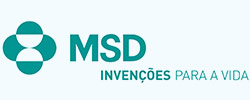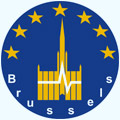Final deadline for submission: APRIL 10TH, 2019
1. CRITERIA FOR SUBMITTING AN ABSTRACT
▪ All abstracts should be sent in by April 10th, 2019, through the official website of the Symposium — after this date no abstract will be accepted;
▪ All the abstracts must be in English. The spelling of any abstract must be defined as American English (United States) or British English (United Kingdom), but never a mixture of the two.
▪ The font to be used is 11 point Times New Roman, single spaced;
▪ The total length of the abstract (names, affiliations, text, tables, and figures) should not exceed 3,000 characters including spaces).
▪ There is no limit of abstracts per author;
SEE HERE A MODEL OF ABSTRACT
▪ The presenting author must be registered at the symposium by June 28, 2019;
▪ Only one certificate will be issued per abstract, indicating the title and the names of all authors, according to the text produced, who will receive the certificate during the symposium;
▪ The abstracts sent to the scientific journal must be original and cannot have been previously published in any other form;
▪ The abstracts submitted will be analyzed by peer reviewers appointed by the Organizing Committee of 10th ISICEM for LA and, after this evaluation, the selected abstracts will be forwarded for a final evaluation by the editor of the Critical Care Supplements.
▪ The final acceptance of the abstract for presentation at the 10th ISICEM for LA will be confirmed by June 05, 2019.
▪ The Editor-in-chief of Critical Care will review the abstracts approved for presentation at the 10th ISICEM for LA and render his decision(s) for publication in Critical Care. Our goal is to ensure that the decisions related to the final acceptance for publication be made by May 24, 2019. The organizers of the 10th ISICEM for LA will inform the authors that the acceptance of their abstracts for publication in Critical Care is subject to the approval of the scientific journal, regardless of their acceptance for presentation at the congress.
▪ If the quality of the abstract is significantly lower than expected, it is conceivable that this may result in a decision to refuse the publication in Critical Care. Thus, the editors of Critical Care reserve the right to refuse the abstracts selected by the Organizing Committee of the 10th ISICEM for LA. These cases are very rare, so we insist that the authors follow their guidelines carefully.
2. SECTORS FOR REGISTERING AN ABSTRACT
▪ Setor 01. Basic Science
▪ Setor 02. Hemodynamics/Shock
▪ Setor 03. Sepsis / Septic shock
▪ Setor 04. Infection
▪ Setor 05. Cardiology
▪ Setor 06. Nephrology
▪ Setor 07. Pneumology
▪ Setor 08. Neurology
▪ Setor 09. Nutrition / Metabolism
▪ Setor 10. Epidemiology
▪ Setor 11. Surgery / Trauma
▪ Setor 12. Safety / Quality / Management
3. ORIENTATIONS FOR DEVELOPING AN ABSTRACT
▪ All research involving humans or animals described in the abstracts is to be conducted in accordance with the relevant requirements of consent and ethics and comply with the policies of the scientific journal (http://www.biomedcentral.com/submissions/editorial-policies), and any trials submitted are to be registered in the appropriate clinical trial registration database.
▪ Consent for publication, if the abstract includes information related to individual participants (for example, a report and case series), the participants must provide their informed consent for publication of that information in writing and a statement to that effect must be included at the end of the abstract. The guidelines relating to declarations of consent can be found in the site http://www.biomedcentral.com/about/editorialpolicies#Ethics. CLICK HERE AND GET FORM CONSENT FORM. If the patient has died, the consent for publication should be obtained from the next of kin and if the patient is under 16 years of age, consent must be obtained from the parents or legal guardians.
▪ Clinical trial registration database, if the abstract reports the results of a controlled medical intervention, the trial registration, along with the unique identification number (e.g. Clinical trial registration database: Current Controlled Trials ISRCTN37824458) must be listed at the end of the abstract. Before submission, the authors of controlled trial reports with medical interventions must register their trial in the proper and publicly accessible registration database. The trial registration database that currently meets all guidelines of the ICMJE can be found at http://www.icmje.org/about-icmje/faqs/clinical-trials-registration/.
IMPORTANT INFORMATION
Title
The title should be in bold, sentence case with no full stop at the end and no underlining, e.g.: Results from experiments in this field
Authors
First name, middle initials if required, and surname with no full stop at the end. Underline the name of the corresponding author. A comma should separate author names. Where authors are from a number of different institutions, the appropriate institution number from the affiliation list should be given as a superscript number immediately after each author's name, e.g.: John Smith1, Susan Jones1, Bill Fisher2
An asterisk * should be used to link the corresponding author with their email address, if being included.
If the authors are presenting an abstract on behalf of a study group, this information should not be included in the author list, but should appear in an Acknowledgements section.
Affiliations
Affiliations should include department, institute, town and country. Where there are multiple affiliations, each should be listed as a separate paragraph. Each institute should appear in the order used against the author names (see above paragraph) and show the appropriate superscript number, e.g.:
1 Department, University, Town, State, USA
2 University, Town, State, UK 2 Company, Town, State, Canada
Main Text
• Should not be more than the maximum specified by your conference organizer
• Please use single line spacing
• Type the text unjustified, without hyphenating words at line breaks
• Use hard returns only to end headings and paragraphs, not to rearrange lines
• Use the BioMed Central reference format (see below)
• Greek and other special characters may be included. If you are unable to reproduce a particular special character, please type out the name of the symbol in full
• SI units should be used throughout (litre and molar are permitted, however)
• Web links (URLs) should be provided in full, including both the title of the site and the URL, in the following format: Mouse Tumour Biology Database http://tumor.informatics.jax.org/cancer_links.html
• Abbreviations should be used as sparingly as possible and should be defined when first used
Structured Abstracts
In structured abstracts, titles of the paragraph should be typed in boldface without using a colon at the end. Do not use the title 'Abstract'. Each title must be in a separate paragraph, for example:
Introduction
Followed by the regular text, in a new line and in the same format as shown above for the main text.
Materials and methods
Results
Conclusions
Tables
Tables
Tables should be numbered (e.g. Table 1) with a short, descriptive title. Tables should be included in the document where they are to appear. Tables must be cited/called out in the text. Tables should be formatted using the "Table function" in a word processing program to ensure that columns of data are kept aligned when the file is sent electronically. Tables should not be created with tabs or submitted as images. No colour or shading should be added.
Figures
Figures should be numbered (e.g. Figure 1) with a short, descriptive title. This text must form part of the text file and not the figure file. Figures must be cited/called out in the text.
You must have permission to use figures.
Preferred files formats:
• JPEG (best for photographic images)
Figures must be supplied electronically in the body of the text in high quality (300 dpi minimum). Each figure must be inserted as a single, composite file (parts must not be separate graphical units). Don’t include figures with embedded hyperlinks.
Detailed guidelines on figure preparation and all accepted file types can be found here:
https://www.biomedcentral.com/getpublished/writing-resources/data-presentation
Acknowledgments
Brief acknowledgements may be included and should be placed after Conclusions and before the References. If the abstract is being presented on behalf of a study group, this information should be noted here rather than in the author list.
Clinical trial registration
BioMed Central supports prospective registration of randomized controlled clinical trials. Abstracts related to RCTs should include the trial registry along with the unique identifying number. Trial registers that currently meet our requirements can be found at http://www.icmje.org/about-icmje/faqs/clinical-trials-registration/.
Consent for publication
If the abstract contains details relating to individual participants (for example a case report), written informed consent for the publication of these details must be obtained from the participants and a statement to this effect should appear at the end of the abstract. Our guidelines for consent statements can be found here: http://www.biomedcentral.com/about/editorialpolicies#Ethics. If the patient is deceased consent for publication should be obtained from the next of kin and if the patient is under 16 consent should be obtained from the parent or guardian.
References
All references should be cited/called out consecutively in the text, using numbers in square brackets. Only papers that have been published, or are in press, or are available through public e-print/preprint servers should be included in the reference list.
Journal abbreviations should follow MEDLINE standards.
References should be laid out at the end of the abstract in Vancouver style and be preceded by the relevant reference number. Please ensure that the number of references listed is reasonable and does not exceed more than half a page.
An example of a reference for a journal article follows.
1. Lastname A, Lastname B, Lastname C. Title of journal article. Journal Medline abbreviation. Year; Volume:first page-last page.
2. Lastname E. Title of book chapter. In: Lastname F, editors. Name of Book. Volume 2. 2nd edition. Place: Publisher; Year. p.first page-last page.
3.Chomczynski P, Sacchi N. Single-step method of RNA isolation by acid guanidinium thiocyanate-phenol-chloroform extraction. Anal Biochem. 1987; 162:156-159.
- SEE HERE A MODEL OF ABSTRACT
4. CRITERIA FOR PRESENTING A PAPER
The papers will be presented in the free theme or e-poster format.
▪ The presentation mode (free theme or e-poster) will be reported to the authors by the Scientific Committee and organizer of the 10th ISICEM on 31/05/2019.
E-poster Mode
▪ Send a Power Point presentation no later than June 10, 2019 to the email: faleconoscoisicem@einstein.br, in landscape slide orientation.
▪ The presentation should have no more than five slides.
▪ The e-poster should contain a structured abstract, with the following items: Background, Objective, Methods, Results, Conclusions
▪ The papers shall be presented at the e-poster session by their creators, who must be registered at the event.
Free Theme Mode
▪ Dates, times and general guidelines for submission will be sent by email by the Scientific Committee and organizer of the 10th ISICEM soon.
5. AWARDS TO THE BESTS PAPERS
The presentation sessions of scientific papers in the form of E-posters, will be the highlight activity of the 10th ISICEM, as it has been in the nine previous versions of the event.
Displayed in a specific and strategic area, the papers will be published in the supplement of the Critical Care journal, edited by Prof. Jean-Louis Vincent, after their evaluation.
Three of these posters will be selected by a scientific committee and will receive the following Jozef Féher prizes:
▪ 1st place: R$ 5,000.00
▪ 2nd place: R$ 3,250.00
▪ 3rd place: R$ 2,000.00
The award ceremony will be held at the Solemn Session of the event, scheduled for July 10, 2019.
The International Symposium on Intensive Care and Emergency Medicine for Latin America (LA) is organized in collaboration with the Intensive Care Therapy of Hospital Israelita Albert Einstein and the Department of Intensive Care Therapy of Hospital Erasme at Université Libre de Bruxelles.
Register today for the largest Intensive Care Therapy symposium in Latin American!
NEWSLETTER



















































